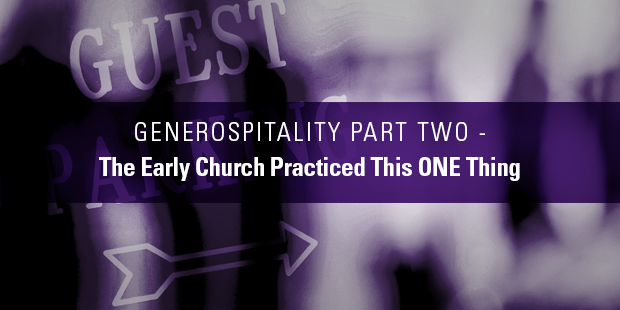
Generospitality Part Two – The Early Church Practiced This ONE Thing
“I give you a new command: Love one another. Just as I have loved you, you are also to love one another. By this everyone will know that you are my disciples, if you love one another.” – John 13:34-35 CSB
Beyond gathering, eating, singing and serving, the Acts 2 Church pursued one practice above all others: The early church loved people.
In context, the love of the first century church would have been quite revolutionary. The Hebrews earned love. The Greeks intellectualized love. The Romans debased love. And within each of those people groups, love was exclusive to those on the inside, rarely extended to anyone, not a part of “their tribe.” Then along came the early followers of Jesus who perfected love. They demonstrated the lavish love of Jesus, to every people group, albeit somewhat begrudgingly at times. Clearly hidden in these verses is a caring for others that made these people of “The Way” unbelievably attractive to a watching world.
But theirs was not love as a generalized and ethereal concept, like when my mom used to tell me to love my little brother and not lock him outside the house in his underwear. I had no clue what that meant apart from just being nicer to him, which didn’t seem nearly as much fun. It appears that the Early Church understood love to be more than an idea of behavior or more words. For them, caring for people was more than a catchy scriptural saying painted on their walls inspiring everyone to “love God and love others.”
For these early followers of Jesus, love went beyond the words and consistently manifested itself in two distinct parts. First, love for each other, the insiders, marked by their generosity. They gave to all who had a physical need among them. At the same time, the Church demonstrated love for the stranger, the outsiders, marked by their hospitality. They welcomed all from outside of the church who had a spiritual need. These were twin concepts. Like a coin with two sides, love appeared on the inside of the church through giving, and on the outside through welcoming.
Think about this for a moment. The early church, if any generation of Christians, were a group of people in possession of every reason to circle the wagons and focus on survival. But, after being given a boldly public platform at Pentecost, they left the upper room and immediately reached out to those outside of themselves. The lost without Christ were drawn every day to a new religion, one built on relationship over rules. The Lord added to the early church every day through their love, expressed inside the body as generosity and outside the body as hospitality. It would have been unimaginable for a first-century believer to claim the name of Jesus without also pro-claiming the love of Jesus. This love exploded throughout Jerusalem through their giving, or loving the ones they knew, and in their welcoming, or loving the ones they did not yet know.
Love for those in the body of Christ, brotherly love, motivated the generous heart of the Early Church, found throughout the New Testament as philadelphia. Love for those outside of the Church, literally love for the stranger, moved the welcoming arms of the Early Church, known to all as philoxenia.
It is, and always has been, that simple. Be generous and love those inside of the Church. Be hospitable and love those outside of the Church. Even today, how your church loves makes a difference.

Tags: Bryan Rose, Generospitality













